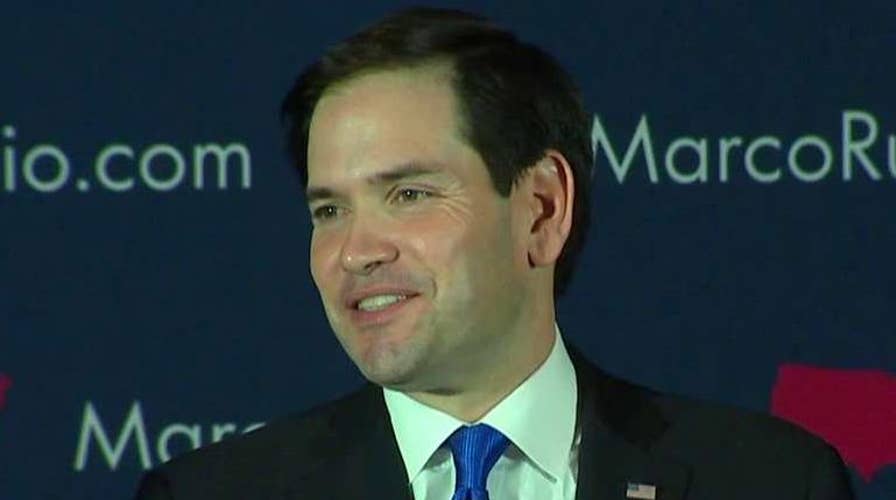Rubio: South Carolina, we are on the way
Republican presidential candidate speaks to supporters as he battles for third place finish in New Hampshire
Media attention is like a spotlight. It illuminates the present with a blinding light and then proceeds to view both past and future in the reflected glow of the current moment. If the moment is one of triumph, like today is for Donald Trump and Bernie Sanders, the media likes to jump forward to map their winning routes to the nomination, or back to discover the seeds of their inevitable success. If the moment is one of disappointment, like today is for Marco Rubio and Hillary Clinton, this exaltation of the present leads to a sort of piling on, a sort of unseemly eagerness to get on with the post-mortem before the subject is dead.
Rubio’s fall from media grace, his “glitch,” is, ironically, a chance to show that he is much more than a quick study and promising pol. It is a chance to show the sort of personal resilience and capacity for growth that sets a candidate apart from their highly stage-managed media image.
Marco Rubio’s campaign fortunes are a particularly dramatic example of the reinterpretation of electoral reality based on the changing vicissitudes of the primary season. Last week, based on a third place finish in the Iowa caucus, Rubio was seen as a world-beater, capable of uniting the anti-Trump, anti-Cruz, majority of the Republican Party. Today, after a fifth-place finish in New Hampshire, Rubio is all but written off as a dead man running. The man has not changed. His record and positions have not changed. And yet, for the pundits, it is all irrevocably altered.
The moment that the commentators have seized on to explain the turn-about is Rubio’s performance in the last GOP debate — the hilariously nicknamed Rubio “glitch,” in which he repeatedly fell back on formulaic campaign wording after being accused of being an empty suit with nothing to offer beside formulaic campaign-speak. The “glitch” hurt Rubio’s image, no doubt. It is the kind of funny, superficially “telling” moment, that lends itself to replaying on TV talk shows and Youtube.
But such “tells” form part of every successful politician’s career — they are part of the white noise of politics, the sound and fury, that must be survived, left behind, if not transcended, in the course of a political life. Ronald Reagan and Bill Clinton are two politicians who have surmounted such moments. Remember when Ronald Reagan referred to military uniforms as costumes on a televised debate, prompting hoots about Hollywood actors running for President? Or when Bill Clinton’s keynote address at the Democratic convention was described as a career-killing, wonk snooze-fest by TV pundits?
But, Reagan and Clinton, survived the moment by learning from it, by understanding that they needed to deepen their connection with the electorate. Both, of course, were master politicians in the sense that they could turn a mis-step into a moment of humility and authenticity. They could jujitsu their mistakes into a reason to like and vote for them.
Rubio is a good politician, and good politicians find a way to turn adversity into opportunity. The qualities that lead him to succeed in Florida politics and to stand-out in a crowded field of Republican hopefuls have not changed overnight. Rubio’s fall from media grace, his “glitch,” is, ironically, a chance to show that he is much more than a quick study and promising pol. It is a chance to show the sort of personal resilience and capacity for growth that sets a candidate apart from their highly stage-managed media image. In a matrix media world, it is learning from, and overcoming, the “glitch” that is the true test.
Eventually, the media frenzy moves on — always from present tense to present tense. And if there is something that the media finds more compelling than the tale of the fall, it is a tale of redemption. Everybody loves a “comeback kid.” If Marco Rubio can earn himself another moment in the spotlight, he will be a much stronger candidate for it.

